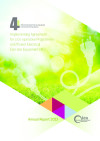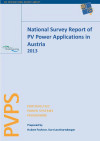Suchergebnisse für "Factsheet: Energietechnologien gestalten, die für alle sinnvoll und nutzbar sind"
Pilot-Biogas plant consisting of prefabricated units
Construction of a biogas tank built of prefabricated reinforced concrete elements, erected and operated at an existing biogas plant in Bruck an der Leitha. The precast concrete technology promised a lot of advantages but also posed a lot of questions that had to be solved. These problems considered especially the sealing method and the general construction with precast concrete elements.
Ecologically friendly resin impregnation of rotating machines with the use of the joule effect
Windings of rotating machines or electrical generators (e. g. wind and water power generators) are impregnated with resin. A new technology using the heating effect of current is investigated. The high efficiency of heating with the joule effect results in quick heating of stator leading to fast gelling of the resin, which implies low emission.
Photovoltaic Roadmap for Austria
Development of a Photovoltaic Roadmap for Austria - a study with the intention to screen the opportunities, economical potential as well as the barriers of the promising technology Photovoltaics as basis for strategic decisions in energy relevant policies.
IEA IETS Task 21 Decarbonizing industrial systems in a circular economy framework
Energy and CO2 savings through circular economy, especially directly through carbon circularity (CCU), and resource and energy efficiency through industrial symbiosis are two key approaches to decarbonizing industry.
Development of a continuous hydrogen-carbon nanofibers production line
With the development of a hydrogen-carbon nanofiber production in a continuous process carbon nanofibers can be produced in an economic way and at the same time access to environmentally friendly hydrogen is enabled.
EasyCell - Design optimization of PEM fuel cells for reducing auxilliaries and simplificating the material-management to facilitate the mass production
EasyCell - A common use of PEM fuel cells is not yet established. It is the aim of this project to optimize the design of PEM fuel cells (minimization of peripheral units, simplified handling of gases and the right design for mass production) to ease a widespread use of PEM fuel cells.
PROMISE - Production with solar energy. Study on the potential of thermal solar energy systems in trade and industry depending on the production processes
Documentation of realized plants for the use of thermal solar energy in trade and industry companies. Identification of production processes and branches, which have a demand for low-temperature heat. Determine the potential of solarthermal systems to provide low-temperature heat. Case studies for branches and processes with the highest mid-term potential for realization of a solar plant.
Raising efficiency by an optimized filters purification system using waste heat in metal industry
Purification and disposal of production effluents in waste water from metal manu¬fakturing processes is of economical and ecological importance for the Joh. Pengg AG. Econamical solutions for optimised purification of the filter textiles and the drying of the filter cake with waste heat have been found.
IEA IETS Task 15: Industrial Excess Heat Recovery (Phase 4)
Excess heat recovery plays a crucial role in reducing emissions in industry. Through strategic planning and efficient process integration, companies can improve their energy efficiency and significantly reduce their carbon footprint. Task XV facilitates the international exchange of experience and knowledge between different companies. This identifies best practices to promote the implementation of energy-efficient technologies in industry.
IEA-IETS Task 19: Electrification of Industry
The electrification of industry can make a major contribution to CO2 reduction. The aim of the task was a transfer of knowledge between the international and the state levels. Nationally, the aim was to spread and establish the topic of “electrification of industry” through stakeholder involvement. A comparison of electrification based on roadmaps and resources was carried out and, above all, systemic aspects of electrification of industry were analysed.
IEA-4E Jahresbericht 2013

Der Jahresbericht umfasst die wichtigsten Errungenschaften des Jahres 2013, sowie eine Zusammenfassung der Aktivitäten der einzelnen 4E Annexes.
Herausgeber: IEA 4E
Englisch, 46 Seiten
Downloads zur Publikation
Recommendations for a consolidated Austrian research in the topic of "Smart Cities"
Based on a clear definition of the topics and focusing on energy relevant aspects the project will provide an overview on the present points of focus in research on "Smart Cities". Furthermore, future research topics will be defined and evaluated, and action plans for political stakeholders will be elaborated in the framework of two expert workshops.
Application of the Stirling cycle for environmentally compatible cooling - systems analysis
Conventional cooling has adverse effects on environment (eg. ozone depletion, global warming). One option for environmentally compatible cooling systems for near ambient temperatures (-10 to -50°C) is the Stirling cooler with environmental friendly process.
Instationarity as a limiting factor for the use of industrial waste heat in heating-networks
Industrial waste heat is predominantly instationary. Thus utilisation of industrial waste heat in district heating systems is constrained. A database and an evaluation methodology were developed to support increased utilisation of this heat source.
National Survey Report of PV Power Applications in Austria 2013

Der Survey report Österreich 2013 gibt einen Überblick über Photovoltaik-Technologieentwicklungen, den österreichischen Markt sowie die nationalen politischen Rahmenbedingungen.
Herausgeber: IEA PVPS Task 1, Technikum Wien
Englisch, 31 Seiten
Downloads zur Publikation
Development and optimization of a parabolic trough solar collector for generation of process heat for industrial processes
Development and optimization of a parabolic trough solar collector for generation of process heat for industrial processes. The operating performance and optimization possibilities of a prototype were evaluated and an improved prototype was tested with respect to its efficiency characteristics as well as in a small-scale application with a realistic load profile.
Raise in efficiency due to optimized waste heat management in heat intensive processes of the metal-working industry
This project drives at optimizing the energy input at the manufacturing process of oil tempered spring steel. This aim is met by investigating different options of waste heat recovery from industrial furnaces and heat insulation of heat treatment bathes. Besides, options of lead removal from anthracite will be listed.
IEA IETS Task 17: Membrane processes in biorefineries (Working period 2023 - 2025)
Biorefineries are essential for the transition from petroleum- to a biobased industry. The use of biomass as raw material for recyclable materials, chemicals and energy sources is essential and requires efficient and sustainable production processes. This project aims to strengthen national and international know-how transfer between research and development for membrane-based processes in biorefineries. The focus is on application, improvement and innovation in all aspects of membrane distillation.
IEA-IETS Annex 15: Industrial Excess Heat Recover (Phase 2)
In the framework of IEA IETS Annex 15 potentials of excess heat and technologies for their integration were collected from national research projects, bundled and elaborated on. This way, a broad knowledge base was built on experience gained in carrying out surveys for potential use of excess heat. Experiences with questionnaires, process integration tools and extrapolation of data using existing knowledge about the respective energy systems were exchanged. A process database with detailed process information could also be established, which can be used for further research activities. Also, in the area of policy instruments, recommendations for future measures to increase the use of surplus heat were derived on the basis of national contributions.
Personal Power Plant
The application of PEM fuel cells is limited to certain singular products. The reason for this are the relatively high prices for the components of a PEM fuel cell. It is the aim of this project to fabricate the components of a PEM fuel cell by using mass production technologies such as injection moulding. In sequence this will lead to wide-spread applications of PEM fuel cells (personal-power-plant).
